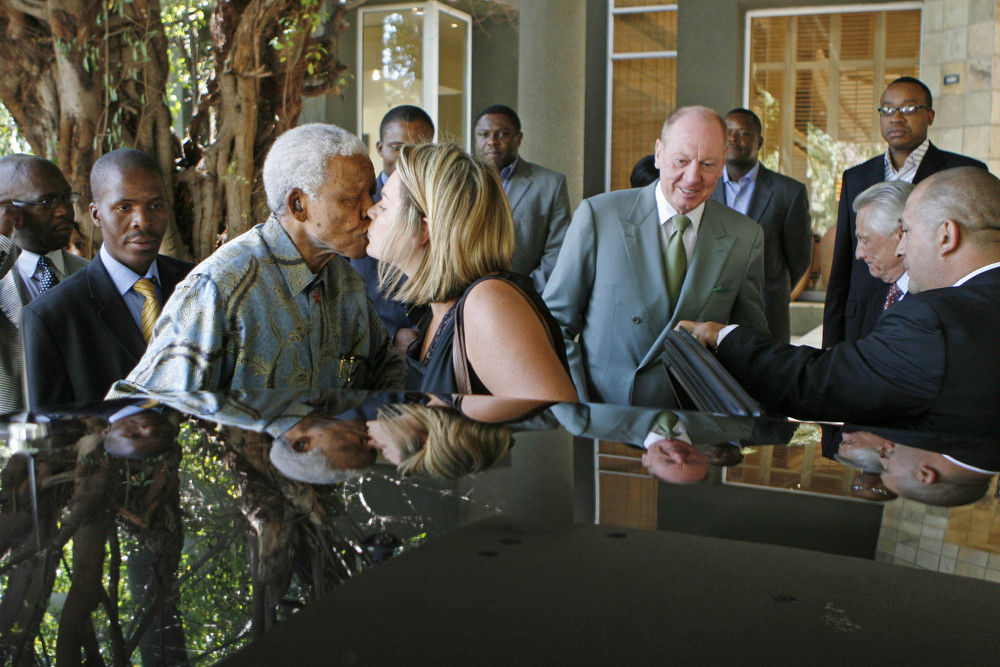
The world pays tribute to Mandela (slideshow)
As South Africans come to terms with the loss of former president Nelson Mandela, the rest of the world bids farewell to Madiba.

Pimples: Saving Madiba's rabbit (video)
Gwede, Mac and Blade try their best to stop the rabbit from whispering in Mandela's ear. But the elusive animal has some tricks up its sleeve.

Zapiro's best Madiba cartoons (slideshow)
From his toughest moments to his most triumphant, Madiba has been an inspiration. Here are some of our favourite Zapiro cartoons about him from 1994 to 2013.

Mandela: SA's greatest son laid to rest (slideshow)
The world watched as Nelson Mandela was finally laid to rest in his hometown of Qunu following a dignified and moving funeral ceremony on Sunday.
It was October 1994 when I resumed duty at the office of the first democratically elected president’s office. Two weeks later, I met President Nelson Mandela for the first time. A feeling of guilt, of responsibility, consumed me.
He spoke to me in Afrikaans, my home language – which, to me, was an acknowledgement of my culture and my existence. I didn’t feel that I was deserving of his attention, of his kind handshake. It was my people who had sent this man and his comrades to jail for life.
The generosity of his spirit and his bright sincere smile were infectious. I would soon look forward to seeing him again. In the 19 years that followed, he spent many hours educating me, mentoring me about the past, the present and the future of South Africa. As time progressed I became fond of the man who was once considered to be my people’s enemy.
The man who was the symbol of freedom worldwide not only took my hand to lead me along a path of understanding but also showed me forgiveness of the self. He did not only free black people from oppression but, by forgiving, he also freed white people from guilt.
On more than one occasion Madiba told me: “Find your roots.” I later travelled twice to Cabrieres in the south of France, from which the La Grange family originates. Apart from the local bee farmer, who confirmed this was the town of the La Granges’ origin, I could find no traces of the Protestants who fled that little town in 1688. Back at home, I traced our roots in South Africa through the French Huguenot museum.
I often heard Madiba saying in speeches that this land is where Afrikaners belong. We have no other home than South Africa. And that we had more in common with black people than any other group in South Africa because we knew what it was like to have to defend our country. He was, of course, referring to Afrikaners’ role in the Anglo-Boer War.
Besides being blessed beyond comprehension by the opportunity to serve him and by the experiences that followed, through the eyes of Madiba I strangely learnt more than I ever had before about my culture, my language and the works of Afrikaans writers such as CJ Langenhoven, Louis Leipoldt, Ingrid Jonker and Breyten Breytenbach.
He taught me that the burden of the history of apartheid is equally shared by all involved or affected by it, but that the past does not have to determine the future. Apartheid could never be condoned, but it did not have to determine how we now behave and relate to one another today.
Above all, he showed us how to forgive and how to love unconditionally. He taught us how to gain self-respect by maintaining our integrity and honesty. His morals and values can be emulated by all. But, as he often said: “It is easier to change others than it is to change yourself.” Unless we strive to become the nation that Mandela and his comrades dreamt of, by changing ourselves first before we expect others to change, we will not live in a country where equality reigns. First and foremost, we have to have the determination to change the “self”.
It is 20 years later and we have to move on from the injustices of the past. We have to remember the sacrifices made so that we could enjoy the freedom of choice, the freedom of speech and the freedom of individuality, among other freedoms.
We survived the pre-election period of 1994. We survived the dissolution of the Government of National Unity and we survived the uncertainty of two successions. We survived the global economic crisis, and we survived the death of Mandela himself.
We are scarred by events such as those involving Andries Tatane, Anene Booysen, Marikana and the fall of Oscar Pistorius. We are scarred by corruption, fraud, continuing injustices and inequality. We now have to survive the challenges of 2014: poverty, job creation, quality education, the lack of basic services and the inequalities people still feel 20 years after democracy’s arrival.
We are free to be individuals, hopefully with a common purpose; to contribute in whatever way to make this country one in which all its people feel they belong and in which all its citizens can enjoy basic services and basic human rights. We must renew our commitment to unite, despite our diversity.
Madiba taught me that I am free to be a proud white Afrikaner in a modern South Africa. This is my country too. Our liberation allows me the freedom to choose how my past will influence my future, but it also gives me the freedom to decide that the past and the history of apartheid will not determine my future merely because I am of French descent; I speak Afrikaans. I am free to be me – but, as we know from Madiba, with freedom comes responsibility.
Zelda la Grange served Nelson Mandela in various capacities from 1994 until his death in 2013. Her memoirs, Good Morning, Mr Mandela, will be published in June


